Subscribe to this podcast via your favourite app
Managing meltdowns is very important. I believe the key is getting in early and putting in place strategies before the behaviour escalates.
You will need a range of strategies to prevent the meltdown escalating. For some students strategies that may help include: ignoring, distracting, redirecting, send on an errand, and more.
Understanding the Three Stages of a Meltdown will make it easier to identify and apply strategies to prevent.
Click This Link for Easy to Read and Print Page >> Managing_Meltdowns
Managing Meltdowns
Managing meltdowns is very important. I believe the key is getting in early and putting in place strategies before the behaviour escalates. You will need a range of strategies to prevent the meltdown escalating. For some students strategies that may help include: ignoring, distracting, redirecting, send on an errand, and more.
Three Stages of a Meltdown
1. Build Up
It may look like:
· Walking in a different pattern.
· Body posture (head down, head on desk, tense).
· Become much more literal.
· Change in voice tone.
· Increase in wringing of hands/hypersensitivity to touch/picking at skin.
· Become slower to respond or increase in vagueness.
· Other students may become highly distractible.
· Become more controlling, asking more questions and more rigid.
· More stock standard answers (I don’t know, I forgot, I’m tired).
2. Survival Mode
In survival mode they will use skills to try and keep a meltdown from beginning. Their coping mechanism is coming into play. It may look like:
· More controlling of their environment.
· Seek sensory input: repetitive actions, flip back on chairs, pacing, jumping on trampoline.
· Sleepy, stay completely still and become rigid.
· Unaware of others.
· Run away, climb, escape, hide (under table, outside, etc).
3. Meltdown/Shutdown
In a meltdown the student is in panic mode and has no control and cognitive function. The student may not be able to respond and will use stock standard actions to make people move away and leave them alone (swearing, pushing, and hitting). A behaviour management programme will usually be ineffective as the student has reached meltdown. The student will need to finish the meltdown before adults can take any action.
Excerpt from Teacher Assistant Big Red Book of Ideas.
Ideas to try when in “Build Up” and “Survival Mode”
· Limit instructions.
· Send student on an errand.
· Walk don’t talk (take the student for a walk but don’t ask questions or comment on behaviour).
· Redirect to quiet time: petition desk, reading corner, sit at teachers desk, headphones.
· Give them a sensory toy to hold.
· Repetitive physical activity: jump on a trampoline, run around the quadrangle/oval, gym circuit.
· May need a toilet break or drink break.
Remember once the student is in meltdown or shutdown it is too late to use most strategies.
———————————————————————————————————————————————————————————
For more information about meltdowns your best reads is From Anxiety to Meltdown or No More Meltdowns.
 |
From Anxiety to Meltdown | by Deborah Lipsky Anxiety is the root cause of many of the difficulties experienced by people on the autism spectrum, and is often caused by things such as a change in routine, or sensory overload. Deborah Lipsky takes a practical look at what happens when things spiral out of control, exploring what leads to meltdowns and tantrums, and what can be done to help. This is the BEST book I have ever read and I rate it a MUST HAVE. For more information or buy this book click >> MORE |
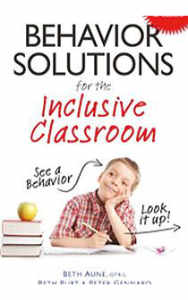 |
Behavior Solutions for the Inclusive Classroom | by Aune, Burt & Gennaro This book is a must-have for every special needs and inclusive classroom. The easy to use format allows teachers to quickly look up an in-the-moment solution and learn about what the child is communicating, and why. This book illuminates possible causes of those mysterious behaviours, and more importantly, provides solutions! I call this SEE A BEHAVIOUR, LOOK IT UP. This is a great reference book to have on hand. ALL behaviours are replaced by another and this book gives you great ideas for replacements and skills to develop. For more information or to buy this book click >> MORE |
Veneer of Coping: Shutdown
A shutdown is a particular sequence of behaviour involving the senses, language skills, motor skills and memory which we observe in children diagnosed as high-functioning within the autism spectrum. In academic settings, when pressured by an adult to perform tasks that were difficult, these children may become unresponsive, sleepy, immobile, limp to the touch for several minutes and then fell asleep in a chair for as briefly as 10 minutes and up to two hours.
Managing Emotions
A key for students to fully participate in education is teaching them to manage their emotions, in particular any anger and/or anxiety. Using Tony Attwood’s Cognitive Behaviour Therapy books to manage emotions is a great tool to use as a return to school or class plan. In my experience withdrawing students and excluding students doesn’t actually resolve the underlying reason why they are not participating in school. By teaching students to understand their emotions and how to manage them has much better outcomes for everyone.
TOP BOOKS TO HELP CHILDREN UNDERSTAND THEIR EMOTIONS AND HOW TO MANAGE THEM
|
Exploring Feelings: CBT to MANAGE ANGER |
Exploring Feelings CBT to MANAGE ANXIETY |
Exploring Feelings for YOUNG CHILDREN |
|
The Red Beast Teaches about Anger |
The Panicosaurus Teaches about Anxiety |
The Disappointment Dragon Teaches about Disappointment |
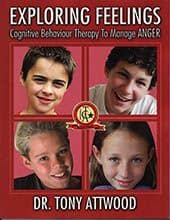

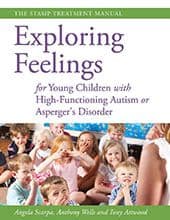
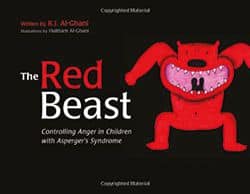
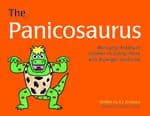



 Sorry we no longer ship items outside Australia. Please consider the digital versions of Sue’s Books –
Sorry we no longer ship items outside Australia. Please consider the digital versions of Sue’s Books – 